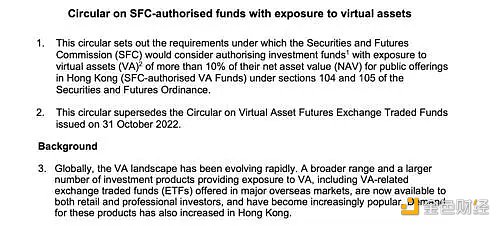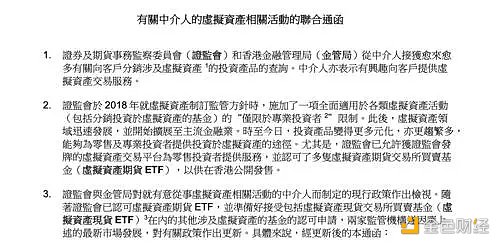Author: China Fund News Wu Juanjuan
A few days ago, the Hong Kong Securities Regulatory Commission issued a notice stating that for public fund products with virtual assets accounting for more than 10%, their management companies, related investment strategies, and product custody institutions must meet corresponding conditions.
On the same day, the Hong Kong Securities and Futures Commission and the Hong Kong Monetary Authority issued a "Joint Notice on Virtual Asset-related Activities of Intermediaries" stating that after the virtual asset futures ETF, Hong Kong The China Securities Regulatory Commission is ready to accept applications for recognition of virtual asset funds, including virtual asset spot ETFs. This shows that after the first batch of Hong Kong virtual asset futures ETFs are released in December 2022, Hong Kong virtual asset spot ETFs may be on the way.
Management companies must have personnel with experience in managing virtual assets
According to current regulations, generally To put it bluntly, institutions holding a No. 9 license from the Hong Kong Securities Regulatory Commission must not account for more than 10% of virtual assets in their fund portfolios. The latest notice clarifies that if the proportion of virtual assets exceeds (or is expected to exceed) 10%, the management agency must apply to the Hong Kong Securities and Futures Commission and obtain approval from the Hong Kong Securities and Futures Commission before relevant products can be sold to Hong Kong investors.

Source: Official website of the Hong Kong Securities Regulatory Commission
This document is titled "The Hong Kong Securities Regulatory Commission "Notice on Approving Funds to Invest in Virtual Assets" clarifies that, first of all, companies that manage virtual asset funds (virtual assets account for more than 10% of the fund) must have a good compliance record, and at least one employee of the company must have the ability to manage virtual assets or related products. experience of. Management companies must meet existing or new requirements for virtual asset management companies by licensing regulators.
In terms of investment targets, virtual asset funds can only invest in virtual assets traded on licensed virtual asset trading platforms in Hong Kong. If you invest in futures, you must invest in futures contracts traded on exchanges and trading platforms recognized by the Hong Kong Securities Regulatory Commission.
In terms of investment strategies, virtual asset funds approved by the Hong Kong Securities and Futures Commission can directly or indirectly invest in virtual asset tokens (tokens). If it invests in futures products, it can only invest in futures products traded on traditional regulated futures exchanges. In addition, companies that manage virtual asset funds must ensure that the futures they invest in have good liquidity and that the roll cost of virtual asset futures is controllable. The Hong Kong Securities and Futures Commission has clarified that virtual asset funds are not allowed to leverage virtual assets at the fund level. If a virtual asset fund approved by the Hong Kong Securities and Futures Commission mainly invests in futures-related strategies, it should adopt an actively managed investment strategy and the portfolio construction should be flexible.
In terms of custody institutions, virtual asset funds recognized by the Hong Kong Securities Regulatory Commission must use virtual asset platforms or financial institutions recognized by the Hong Kong Securities Regulatory Commission for virtual asset custody. Relevant virtual asset platforms or financial institutions must meet the requirements of the Hong Kong Monetary Authority for custody institutions.
The custodian institution must ensure that the virtual asset positions it holds under custody are segregated from its own assets or the assets it holds custody for other clients. It must ensure that most virtual assets are stored in cold wallets. The number of virtual assets stored in "hot wallets" must be as small as possible. Virtual asset professionals told reporters that "cold wallets" are offline wallets with higher security. The custodian must ensure that the “seed phrase” and private key of the virtual asset are kept in Hong Kong. The scope of this information is strictly limited to authorized persons. In addition, the Hong Kong Securities and Futures Commission has other requirements for the security of private keys.
Generally speaking, virtual asset wallet providers convert private keys into "seed phrases" through encryption. The words in the "seed phrase" match the code snippets that make up the private key. When a user creates a new wallet, the wallet provider provides a "seed phrase" that is a last resort for users to obtain their private passwords.
Sales agencies must conduct virtual asset knowledge assessments on customers
On the same day, the Hong Kong Securities and Futures Commission and the Hong Kong Monetary Authority jointly issued the "Joint Notice on Virtual Asset-related Activities of Intermediaries" setting out relevant regulations on the sales, transactions, asset management, and consultation of virtual assets.

Source: Hong Kong Securities and Futures Commission website
The notice stated that virtual asset funds authorized by the Hong Kong Securities and Futures Commission for public offering are not subject to the "limited to professional investors" restriction. However, distribution of the Fund is subject to the regulations set forth below.
First of all, for funds listed on the Hong Kong Stock Exchange, if there is no solicitation or advice involved, institutions can execute client trading instructions for these funds on the exchange. However, institutions should still conduct virtual asset knowledge assessments on relevant clients. Secondly, for unlisted funds or funds that are listed but the trading of fund units is conducted over-the-counter (including unlisted shares/unit classes of virtual asset futures ETFs/virtual asset spot ETFs authorized by the Hong Kong Securities and Futures Commission), institutions should comply with Suitability requirements and providing customers with clear and understandable information and warning statements about virtual asset-related products, as well as information about the virtual assets they invest in, and conducting virtual asset knowledge assessments on relevant customers. If the fund is also a virtual asset derivatives fund, the institution must also comply with the current regulations on derivatives.
What is the knowledge assessment of virtual assets? In response to this issue, the Hong Kong Securities and Futures Commission stated in the notice that unless the client is an institutional professional investor and a qualified corporate professional investor, the institution should first evaluate the client's investment in virtual asset-related products before executing transactions on behalf of the client. Knowledge of virtual assets or virtual asset-related products. If the customer does not have the relevant knowledge, the institution can only execute the relevant transaction after providing sufficient training to the customer. The training relates to the nature and risks of virtual assets. Institutions should also ensure that customers have sufficient net assets to enable them to bear the risks and possible losses of buying and selling virtual asset-related products.
Since the Hong Kong government issued the "Policy Declaration on the Development of Virtual Assets in Hong Kong" in October 2022, the relevant virtual asset trading and investment systems have been gradually improved. On December 13, 2022, CSOP Asset Management Co., Ltd. ("CSOP") launched Asia's first batch of virtual asset ETFs, namely CSOP Bitcoin Futures ETF and CSOP Ethereum Futures ETF. On June 1, 2023, the Hong Kong Securities and Futures Commission began to accept applications for virtual asset trading platforms. Currently, two institutions have been approved to become licensed virtual asset trading platforms. After the risk incident occurred on the unlicensed virtual asset trading platform JPEX in September 2023, the Hong Kong Securities and Futures Commission improved the transparency of the virtual asset platform application process: it not only disclosed on the website the institutions that had been approved for the license, but also disclosed on the official website that the applications had not yet been submitted. List of institutions that were approved, submitted applications, but had their applications rejected. At the same time, the Hong Kong Securities and Futures Commission also reminded investors to be wary of suspicious virtual asset trading platforms and provided a list of some suspicious virtual asset trading platforms. Currently, Hong Kong is one of the few jurisdictions in the world that has a regulatory system for virtual assets, attracting the attention of global virtual asset practitioners.
 JinseFinance
JinseFinance





